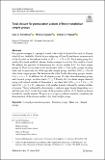Files in this item
Total closure for permutation actions of finite nonabelian simple groups
Item metadata
| dc.contributor.author | Freedman, Saul Daniel | |
| dc.contributor.author | Giudici, Michael | |
| dc.contributor.author | Praeger, Cheryl E. | |
| dc.date.accessioned | 2023-03-03T17:30:03Z | |
| dc.date.available | 2023-03-03T17:30:03Z | |
| dc.date.issued | 2023-03-02 | |
| dc.identifier | 283263029 | |
| dc.identifier | 24d0829b-5229-464c-93a0-f30e00083a3a | |
| dc.identifier | 85149242709 | |
| dc.identifier.citation | Freedman , S D , Giudici , M & Praeger , C E 2023 , ' Total closure for permutation actions of finite nonabelian simple groups ' , Monatshefte für Mathematik . https://doi.org/10.1007/s00605-023-01822-5 | en |
| dc.identifier.issn | 0026-9255 | |
| dc.identifier.uri | https://hdl.handle.net/10023/27098 | |
| dc.description | Funding: St Leonard’s International Doctoral Fees Scholarship (SF); Australian Research Council (DP190101024, DP190100450). | en |
| dc.description.abstract | For a positive integer k, a group G is said to be totally k-closed if for each set Ω upon which G acts faithfully, G is the largest subgroup of Sym(Ω) that leaves invariant each of the G-orbits in the induced action on Ω ×···×Ω = Ωk. Each finite group G is totally |G|-closed, and k(G) denotes the least integer k such that G is totally k-closed. We address the question of determining the closure number k(G) for finite simple groups G. Prior to our work it was known that k(G) = 2 for cyclic groups of prime order and for precisely six of the sporadic simple groups, and that k(G) ≥ 3 for all other finite simple groups. We determine the value for the alternating groups, namely k(An) = n − 1. In addition, for all simple groups G, other than alternating groups and classical groups, we show that k(G) ≤ 7. Finally, if G is a finite simple classical group with natural module of dimension n, we show that k(G) ≤ n + 2 if n ≥ 14, and k(G) ≤ ⌊n/3 + 12⌋ otherwise, with smaller bounds achieved by certain families of groups. This is achieved by determining a uniform upper bound (depending on n and the type of G) on the base sizes of the primitive actions of G, based on known bounds for specific actions. We pose several open problems aimed at completing the determination of the closure numbers for finite simple groups. | |
| dc.format.extent | 18 | |
| dc.format.extent | 406895 | |
| dc.language.iso | eng | |
| dc.relation.ispartof | Monatshefte für Mathematik | en |
| dc.subject | k-closed permutation groups | en |
| dc.subject | Primitive groups | en |
| dc.subject | Base size | en |
| dc.subject | Simple groups | en |
| dc.subject | T-DAS | en |
| dc.title | Total closure for permutation actions of finite nonabelian simple groups | en |
| dc.type | Journal article | en |
| dc.contributor.institution | University of St Andrews. Pure Mathematics | en |
| dc.identifier.doi | 10.1007/s00605-023-01822-5 | |
| dc.description.status | Peer reviewed | en |
This item appears in the following Collection(s)
Items in the St Andrews Research Repository are protected by copyright, with all rights reserved, unless otherwise indicated.

